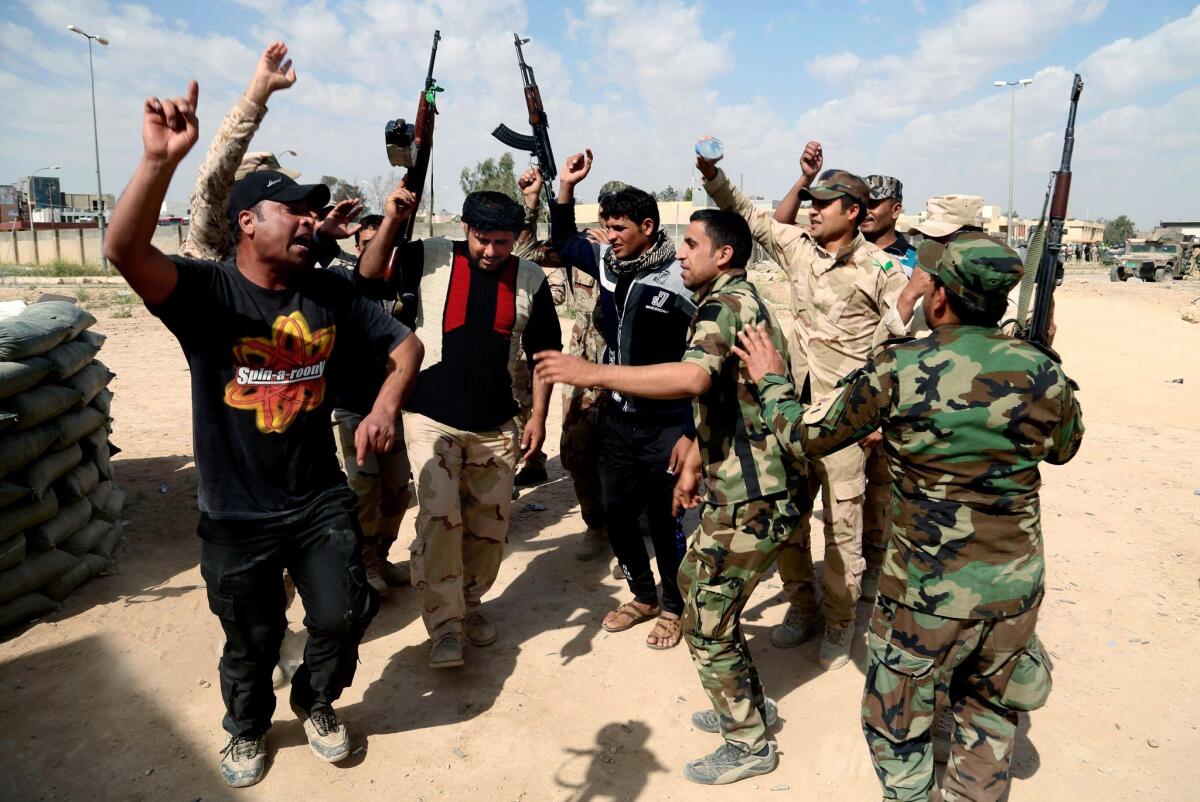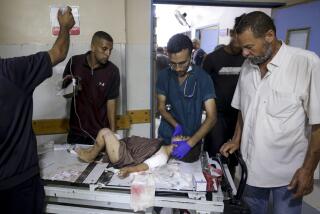Iraqi forces pause fighting in Tikrit to allow residents to leave

- Share via
Reporting from Baghdad — Pro-government forces in Iraq that have besieged the militant-held city of Tikrit were at a standstill Monday, in what officials said was a deliberate hiatus designed to allow civilians to escape the city.
In a joint news conference with the provincial governor held in Samarra, south of Tikrit, Iraqi Interior Minister Mohammed Ghabban said security forces “had given the opportunity for inhabitants to leave Tikrit city and to preserve the lives of civilians and infrastructure,” according to a statement released by the ministry.
This “will also reduce losses in the ranks of the security forces, since the enemy is using its losing card, which is car bombs,” the minister said.
State media, meanwhile, displayed slogans announcing that there was “no backing down” from the battle for Tikrit, hometown of Saddam Hussein, as reports came of the destruction of the former Iraqi strongman’s grave in the city.
State media also broadcast interviews with various military officials who downplayed the stall, saying that military operations had not ceased and accusing opposition media of seeking to “demoralize people.”
In Tikrit, pro-government forces who have entered the city face sniper fire and more than 1,000 explosive devices spread over Islamic State-held parts of the city and its surrounding villages, according to state media. Officials have been pressed to explain why the city has not yet been retaken.
Raed Jabouri, governor of Salahuddin province, of which Tikrit is the capital, pointed to the return of more than 80 families to the nearby towns of Al-Alam and Al-Jalam, taken last week, after they had been “cleansed,” according to a statement on the governor’s official Facebook page.
Recapturing Tikrit from Islamic State militants has been the objective of a 2-week-old government campaign. The offensive, touted by state media as an all-Iraqi operation that represents “the greatest example of national solidarity,” involves about 30,000 fighters from the ranks of the country’s army and police, as well as thousands of Shiite Muslim paramilitary fighters and a contingent of Sunni Muslim tribal forces. Military advisors from Shiite Iran are reported to be aiding Iraqi forces.
Many have accused the Shiite militias leading the charge of wanting to take revenge for the killings of hundreds of Shiite security forces by Islamic State militants last year near a former U.S. base known as Camp Speicher. The mass killings have become a rallying call for Shiite militiamen who have yet to determine the exact fate of many their coreligionists.
Advancing fighters have found mass graves throughout the province, according to pro-government accounts. On Monday, state media declared the closure of a mass grave in the Albo Ujayl area that contained 13 corpses, which were sent to the Health Ministry in the capital, Baghdad, for DNA analysis.
In June, Islamic State militants overran wide areas in Iraq, including the northern city of Mosul, in a stunning advance that saw Iraqi soldiers throw away their uniforms and run for their lives. Two months later, a U.S.-led military coalition to stop Islamic State’s advance began bombing militant positions in Iraq. The air campaign was later expanded to target militant targets in Syria.
But there has been no sign of Western air support in the offensive in Tikrit, despite speculation that the pause in fighting was in anticipation of coalition strikes.
Responding to questions regarding cooperation with the coalition, Ghabban said he would welcome “any cooperation that aims to end the presence of the terrorist gangs,” adding that the coalition would intervene if asked by the Iraqi government.
Brig. Gen. Abdul-Wahab Saadi, the chief of operations in the province of Salahuddin, denied earlier reports in which he was quoted saying that coalition airstrikes were “necessary” to retake Tikrit.
“This is a totally Iraqi operation,” said Saadi in an interview broadcast on Al Iraqiya on Monday.
Bulos is a special correspondent. Times staff writer Patrick J. McDonnell in Beirut contributed to this report.
More to Read
Sign up for Essential California
The most important California stories and recommendations in your inbox every morning.
You may occasionally receive promotional content from the Los Angeles Times.













